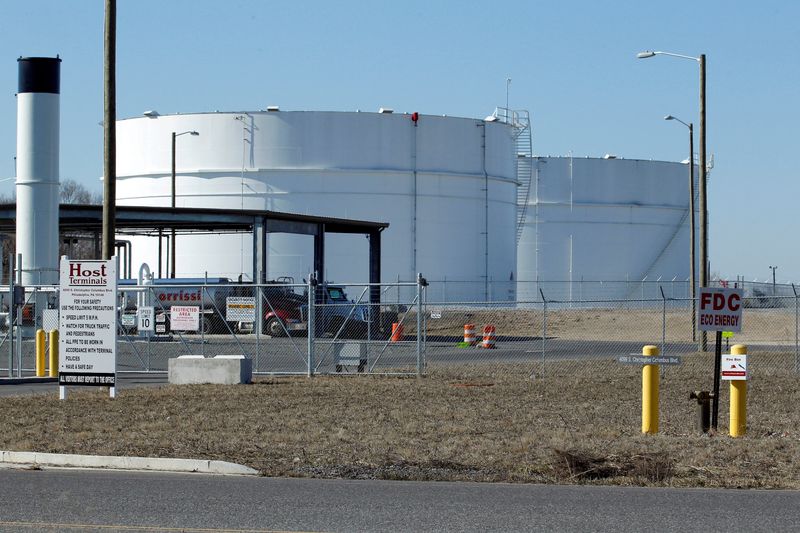(In paragraph 18, corrects to show Navigator pipeline was denied permit in South Dakota, not North Dakota)
By Leah Douglas and Laura Sanicola
WASHINGTON (Reuters) -The U.S. drive to develop sustainable aviation fuel (SAF) using ethanol could be slowed because of growing opposition to proposed pipelines that would curb greenhouse gas emissions from ethanol plants by capturing carbon dioxide and carrying it away to other states for storage.
Ethanol industry players say the developments raise questions about future growth for U.S. producers of the biofuel, including POET, Valero and others, who have been banking on proposed carbon capture and storage (CCS) pipeline projects across the heartland.
These are needed to lower ethanol’s climate impact enough for the fuel to qualify as a feedstock for SAF under the U.S. Inflation Reduction Act (IRA).
President Joe Biden's administration has committed to producing 3 billion gallons of SAF annually by 2030 and 35 billion gallons by 2050. The goal is to decarbonize the airline industry while also supporting the ethanol sector and the corn farmers that supply it.
The proposed pipeline projects would siphon millions of tons of CO2 off Midwest ethanol processing plants and move the gas to other states for underground injection. Some residents along the pipeline routes worry the pipelines could spring deadly leaks or that their land will be seized to build the projects.
Last month, Omaha-based Navigator CO2 Ventures canceled its proposed pipeline. Two others underway from Iowa-based Summit Carbon Solutions and Denver-based Wolf Carbon Solutions face permitting setbacks and public resistance.
"Without carbon capture and storage, conventional ethanol does not have a pathway into SAF under today's policies," said Homer Bhullar, vice president at biofuel producer Valero Energy (NYSE:VLO), which was an investor in Navigator, said on the company’s Oct. 26 quarterly earnings call.
Valero declined an interview request.
U.S. corn growers and the politically powerful ethanol industry hope airline fuel production will boost sales as ethanol’s traditional market as a gasoline additive shrivels due to rising electric vehicle use and increased fuel efficiency.
Biden sought to kickstart SAF production with a $1.25 per gallon production tax credit in the IRA. To be eligible for the credit, SAF producers must demonstrate their fuel is 50% lower in emissions than conventional jet fuel.
Currently, using ethanol to make SAF only cuts its emissions by 15%, according to the U.S. Department of Energy (DOE) website.
"MARK MY WORDS"
Under a Biden administration blueprint shared this year, some 10% of the 2030 SAF target is projected to come from ethanol. Biden's public statements have been more optimistic about the role of ethanol in the SAF program.
"Mark my words: the next 20 years, farmers are going to be providing 95% of all the sustainable airline fuel," he said in July at a Maine rally.
Vegetable oils, municipal waste, agricultural residues and other materials are also being developed as feedstocks for SAF, said a DOE spokesperson. But ethanol must be a key ingredient if the SAF program is to hit its targets, said Barry Glickman, a vice president at Honeywell (NASDAQ:HON), an investor in some U.S. biofuel plants.
"If we cannot use U.S. ethanol, then there will be a shortage of SAF," he said.
The DOE spokesperson confirmed that ethanol producers must cut emissions of they want a long-term role in SAF production. Producers say carbon capture and storage is the most effective tool for doing that. Biofuels trade group Growth Energy says the technique can slash emissions from ethanol production by 50% or more.
Still, ethanol producers need carbon pipelines because many ethanol plants are not near geologically appropriate underground storage sites.
Navigator canceled its CCS pipeline project, which would have captured carbon at 18 POET ethanol plants, after South Dakota regulators rejected its permit application and landowners along its route in other states opposed it.
South Dakota and North Dakota have rejected Summit's permit applications this year and the firm has delayed its project's operational date to 2026 from 2024.
Wolf's project also faces opposition in Illinois, the location of its storage site.
Failure of these projects would be a huge detriment to the industry's climate goals, said Nikita Pavlenko, fuels team lead at the International Council on Clean Transportation.
"It would take the most effective tool in their arsenal to reduce their emissions off the table," Pavlenko said.
Other options for reducing ethanol's carbon intensity include using renewable energy at ethanol plants, or climate-friendly farming practices for corn.
The ethanol industry is pushing federal regulators to assess SAF emissions using a different climate model that assigns a lower carbon impact from growing corn. The Biden administration is expected to respond to that request by year end.
